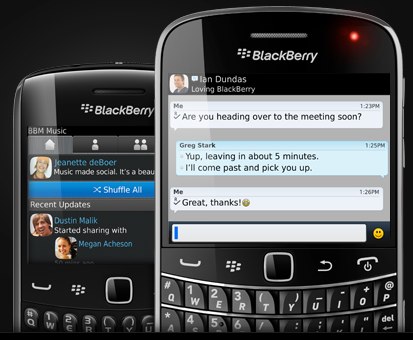
BlackBerry (TSX:BB) today announced a plan to monetize its BlackBerry Messenger service by debuting BBM Shop, which will sell downloadable “virtual goods” such as the stickers they unveiled last month.
Perhaps anticipating a backlash from staid corporate users, whom the company cannot afford to alienate right now, BlackBerry immediately moved to allay any concerns that the BBM user experience would become worse because of the effort.
“At no point should monetization come at the expense of the user,” said senior director of BBM Business Development David Proulx.
“At the expense of the user”. If that phrase doesn’t ring throughout the digital world right now, it should. You need go further than BlackBerry’s own app store, BlackBerry World. Download a game. Chances are, especially if the game is available for free, that you will soon reach a point in which you’ll be asked to haul out your wallet.
The sale of virtual goods is big business. Look at the recently announced IPO of Candy Crush Saga maker Dublin-based King Digital Entertainment, which will go public this week and is looking to raise $612 million at a valuation of $7.6 billion .
“We generate our revenue primarily through the sale of virtual items to users,” says the company’s S-1 filing.
Do they ever. Candy Crush alone pulls in more than a million dollars a day, although that number is said to be softening. From the first quarter of 2012 to the fourth quarter of 2013, the company’s revenue increased from $22 million to $602 million.
______________________________________________________________________________________________________________
This article is brought to you by Revive Therapeutics (TSXV:RVV). Click here to learn how Revive repurposes drugs for treatments in sleep apnea, gout and rare diseases.
_________________________________________________________________________________________________________________
King has more than a hundred titles, but the rest draw scant revenue. And while there is a large segment of the population that has absolutely no idea why someone would pay real money for additional lives or boosters or for hay bales, fences or nutcrackers in FarmVille, for that matter, King Digital doesn’t need them to.
“A relatively small percentage of our player network accounts for a large portion of our revenue”, says the company’s IPO filing.
For BlackBerry, the line it will have to walk is attracting those digital-natives who spend money online naturally, while keeping the user experience the same for those who never would.
The recently cross-platformed BlackBerry app has had some success, including ten million downloads on the first day of its iOS and Android release. In the first two months it was available, more than 40-million Android and iOS users registered BBM accounts, almost doubling its user base, instantly. BBM recently passed 100-million users.
But the competition is positively frightening; WhatsApp, which Facebook paid $19-billion for meanwhile, has nearly 500-million monthly users. Internationally, there’s WeChat in China, KakaoTalk in Korea and Line in Japan.
Frustrating its own user base has become one of the running dialogues behind BlackBerry’s recent demise. New CEO John Chen will have to be adept at stickhandling his way between the hay bails and gnomes and flags and buttons and baubles on his way to monetizing BBM. The company has no extra lives to buy.
_____________________________________________________________________________________________________________
Leave a Reply
You must be logged in to post a comment.






 Share
Share Tweet
Tweet Share
Share




Comment